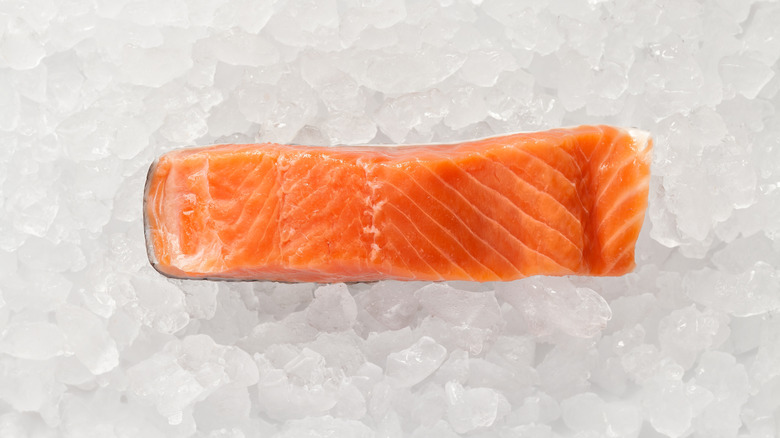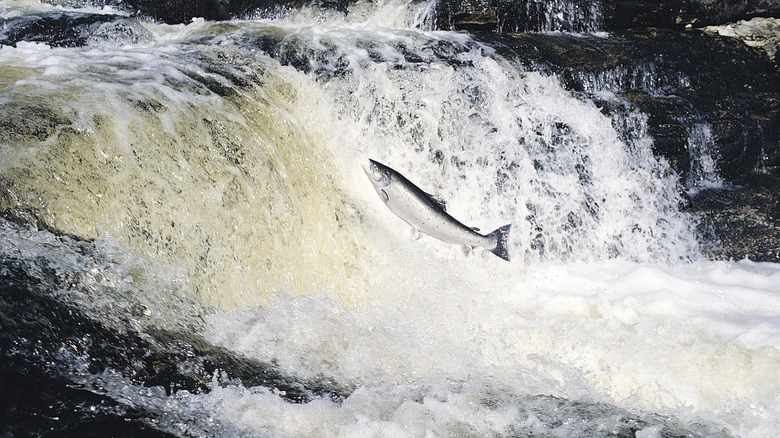Do Yourself A Favor And Avoid Walmart's Wild-Caught Frozen Salmon
Walmart is known for offering grocery staples and a variety of other items at discount prices and, with a network of more than 4,600 stores across the United States, it's easy to see why the company tops the National Retail Federation's 2023 list of top 100 retailers. But if you're looking to stock up on seafood, do yourself a favor and avoid Walmart's wild-caught frozen salmon.
There are a few reasons to keep the store's Great Value Wild-Caught Pink Salmon Skin-on Fillets off your shopping list, first of which being they're not good. At least not according to reviews of the product. The reviews, which average 2.3 out of five stars as of this writing, commonly cite the fish as being "mushy" with a "terrible" and "disgusting" smell and taste. "Very low quality. I'm not even convinced this is an actual fish," one customer wrote.
Customers also complained that the salmon pieces look nothing like the image on the front of the bag and are incredibly waterlogged. This repeated charge is likely due to the sodium tripolyphosphate that's listed as an ingredient. This additive helps food retain moisture but should be avoided, as it ends up diluting the flavor and texture of the fish, leaving a mushy mess behind.
Walmart's salmon sustainability controversy
Another reason to steer clear of Walmart's wild-caught frozen salmon is that it's currently at the center of a controversy over sustainability. In March 2023, a plaintiff in Illinois filed a class action lawsuit accusing Walmart of false advertising for marketing its Great Value seafood products as being sourced sustainably.
According to the suit, the grocery giant uses the recognizable blue checkmark from the nonprofit Marine Stewardship Council (MSC) to indicate to shoppers that its products are "certified sustainable." But, the lawsuit alleges, the company should know that MSC certification isn't that meaningful because the body also certifies fisheries that reportedly harm marine life. On its face, this lawsuit won't likely amount to much (and, indeed, Walmart has already moved to dismiss it), but it is an interesting footnote in the larger conversation about the company's sustainability practices and ties to MSC.
A November 2023 Civil Eats op-ed from Harvard researcher Aaron Van Neste calls into question Walmart's — and the Walton Family Foundation's — relationship with MSC and the entities' shared definition of "sustainable." "MSC's definition of sustainable fishing was loose enough to justify the certification of fisheries that were overfished or where overfishing was ongoing. Those words – overfished and overfishing – don't have a universally agreed-upon definition. So, MSC, critics say, set the bar low, using one of the most permissive definitions," Van Neste writes, concluding that it's all a bit fishy.
Alternative proteins to buy at Walmart
Their frozen salmon may be out, but Walmart does offer some other solid protein options you should buy. When it comes to purchasing meat at Walmart, look for fresh cuts from reputable brands and certified sources, like USDA Choice grades of beef, which typically offer good quality and flavor. While Walmart may not always have the widest selection or highest-end cuts compared to specialty butcher shops, it can still be a convenient and budget-friendly option for purchasing meat for everyday meals.
If you're hankering for a hot dog, try Applegate Naturals Uncured Beef Hot Dogs. Not only are these hot dogs made from 100% grass-fed beef, but they won't leave you guessing with mystery ingredients, just beef, spices, and seasoning.
As far as chicken goes, online reviews urge customers to stay away from Walmart's boneless skinless chicken breasts and its rotisserie chicken. In fact, Walmart is considered the worst place to buy rotisserie chicken. If you are set on purchasing chicken from the retailer, opt for organic chicken breasts or chicken thigh filets free from antibiotics, GMO, corn, and soy.


